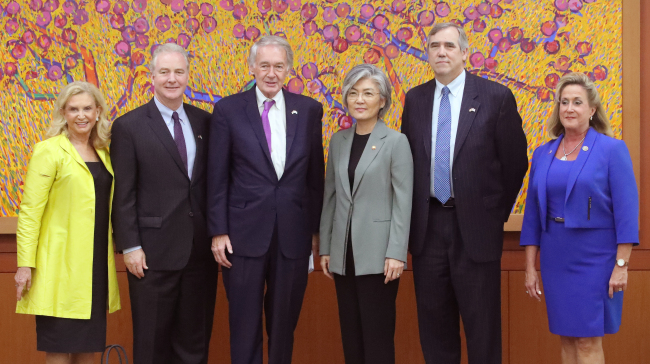‘Preventive war against NK will make matters worse’: US senator
By Jung Min-kyungPublished : Aug. 22, 2017 - 16:40
A senior US senator said Tuesday that the United States will closely cooperate with South Korea to bring North Korea back to the negotiating table and ruled out a preventive war as a way to solve the issues surrounding the Korean Peninsula.
“The US can only peacefully resolve the threat of a nuclear North Korea by pursuing a bold realistic strategy in close concert with allies in (South) Korea and Japan,” US Sen. Edward J. Markey, a Democrat from Massachusetts and ranking member of the Senate Subcommittee on East Asia and Pacific Affairs, said during a press conference in Seoul on Tuesday.
“The US can only peacefully resolve the threat of a nuclear North Korea by pursuing a bold realistic strategy in close concert with allies in (South) Korea and Japan,” US Sen. Edward J. Markey, a Democrat from Massachusetts and ranking member of the Senate Subcommittee on East Asia and Pacific Affairs, said during a press conference in Seoul on Tuesday.

“We must acknowledge that a preventive war cannot solve this problem and (would) make matters much worse,” he said.
Markey said such action is not a solution to the current tensions surrounding the Korean Peninsula and vowed the US Congress would make certain the US president seeks its permission when making decisions.
“Talking with North Korea is not a concession -- it’s the only way to reach agreement to denuclearize the Korean Peninsula and to reinforce that our military strength is there only to deter aggression and defend against attack.”
The visit here from a US bipartisan delegation led by Sen. Markey comes amid heightened cross-border tensions in the wake of the annual South Korea-US Ulchi Freedom Guardian military exercise that kicked off Monday. The five-member delegation includes Sens. Jeff Merkley, a Democrat from Oregon, and Chris Van Hollen, a Democrat from Maryland, along with two members of the House of Representatives, Carolyn Maloney, a Democrat from New York, and Ann Wagner, a Republican from Missouri.
“We have undertaken this mission because we all believe that North Korea is rapidly accelerating the level of nuclear weapons, and ballistic missiles pose an unacceptable risk to the US and to its allies, and to the entire world,” Markey said.
“The US and allies must remain indivisible and ready to respond to aggression with overwhelming force -- Kim Jong-un is certainly homicidal, but not suicidal.”
The US lawmakers acknowledged the importance of preventing a second Korean War on the peninsula, saying it could cost “the lives of millions of people here.”
“We are prepared for war, but are not preparing for war,” said Wagner.
“This delegation is committed to the de-escalation (of tensions on the Korean Peninsula).”
The bipartisan team also underlined China’s role in using its economic clout on North Korea to bring about the hermit state’s denuclearization. Markey said the delegation would return to Washington with the goal of constructing stricter legislation that targets nations maintaining economic and trade ties with the North.
“North Korea’s trading partners must intensify economic pressure to bring North Korea to the negotiating table,” Markey said.
“That starts with getting China to cut off the flow of oil to North Korea. That is the one sure way to have a decisive impact on North Korea’s decision-making.”
In line with its plans, Markey stressed a “two-track approach” in which Washington and Seoul cooperate in leading negotiations with Pyongyang.
“We must begin direct discussions with North Korea on two closely coordinated tracks,” he said.
“On track one, the US would lead direct negotiations toward denuclearization of the Korean Peninsula. On track two, the Republic of Korea would lead direct negotiations toward social, cultural and intergovernmental relations necessary for the long-term well-being for the people on both sides of the border.”
The US delegation met with President Moon Jae-in on Monday and Foreign Minister Kang Kyung-wha on Tuesday to discuss several issues, including the North’s weapons program, the shuttered inter-Korean industrial park and North Korean defectors here. The lawmakers will head to Dandong, in China’s Liaoning province near the North Korea border to discuss North Korean issues with Chinese officials.
By Jung Min-kyung (mkjung@heraldcorp.com)



![[Exclusive] Korean military set to ban iPhones over 'security' concerns](http://res.heraldm.com/phpwas/restmb_idxmake.php?idx=644&simg=/content/image/2024/04/23/20240423050599_0.jpg&u=20240423183955)

![[Graphic News] 77% of young Koreans still financially dependent](http://res.heraldm.com/phpwas/restmb_idxmake.php?idx=644&simg=/content/image/2024/04/22/20240422050762_0.gif&u=)



![[Pressure points] Leggings in public: Fashion statement or social faux pas?](http://res.heraldm.com/phpwas/restmb_idxmake.php?idx=644&simg=/content/image/2024/04/23/20240423050669_0.jpg&u=)










